My neighbor mentioned he was flying to England for a detecting vacation. I thought he’d completely lost it. Who builds an entire trip around swinging a metal detector around fields?
Fast forward three years and five trips later. Now I totally get it.
There’s something special about mixing travel with treasure hunting. You get to touch real history while seeing new places. But here’s the thing nobody warns you about: planning a metal detecting vacation is completely different from booking a normal beach trip. One location might roll out the welcome mat, while just down the road you could end up in handcuffs with your equipment taken away.
I learned this lesson the hard way, and it cost me real money.
Why Your Normal Vacation Planning Won’t Work Here
Picture this: My first metal detecting vacation was a complete train wreck. I read about this amazing spot online, bought a plane ticket, rented a car, and drove straight to the beach. Twenty minutes later, I’m face-to-face with park rangers who aren’t happy to see me. That beach section? Totally off-limits for detecting. My detector sat in my hotel room collecting dust for three days while I desperately googled where I could actually use it legally.
Here’s the thing about treasure hunting destinations. Finding places with buried treasure isn’t hard. The tricky part is dealing with all the other stuff:
- Legal rules that change completely from one place to another
- Getting permission from landowners when you’re just visiting
- Flying with your equipment without airline headaches
- Timing your trip around storms, beach erosion, and tourist crowds
- Acting as a good representative of the hobby when you’re in someone else’s backyard
Experienced detectorists tried warning me about all this stuff. I didn’t listen because I thought I knew better. Now I’m sharing what I learned (mostly through mistakes) about the world’s best metal detecting vacation spots.
The World’s Best Metal Detecting Vacation Spots and Treasure Hunting Destinations
1. Florida’s Treasure Coast: Real Spanish Gold Just Washing Up on the Beach
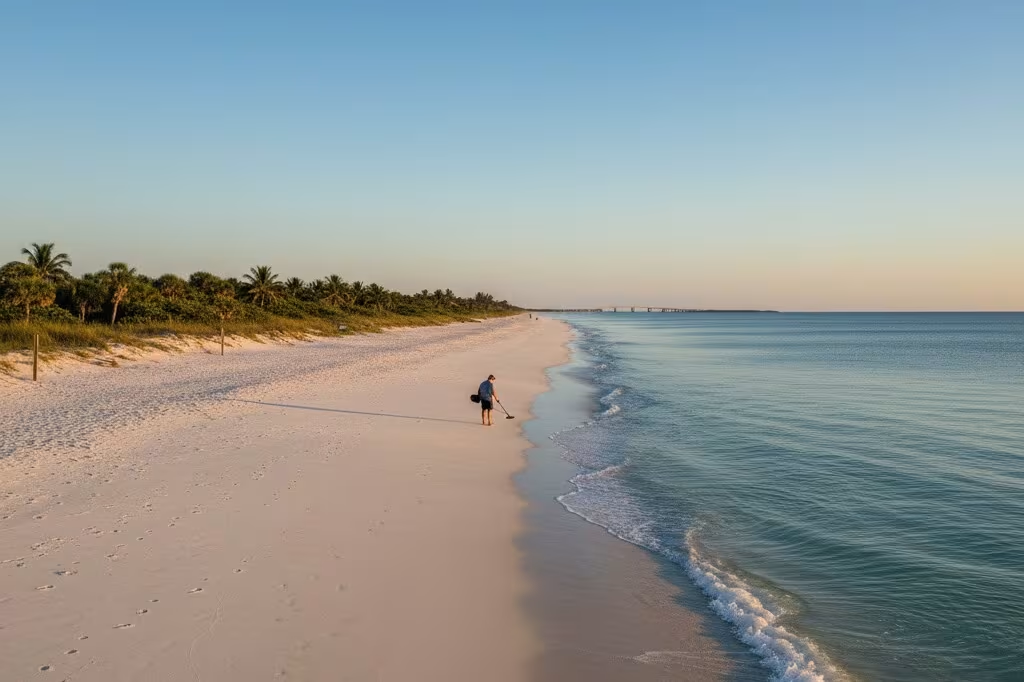
For Beginners: Start here. It’s legal, easy to access, and actually produces finds.
For Veterans: This should be on your bucket list if you’re in America.
Florida’s Treasure Coast got its name for a real reason. Back in 1715, eleven Spanish ships loaded with treasure went down in a hurricane off Cape Canaveral. Here’s the wild part: that treasure is still washing up today. In 2020 alone, people found $4.5 million worth of gold coins just walking these beaches [1].
The sweet spot runs from Fort Pierce up to Melbourne Beach, with Sebastian Inlet right in the middle. Florida law lets you metal detect on public beaches without any paperwork – from where the sand dunes start down to the low tide line [2]. Show up and start detecting. That’s it.
One big rule to know: You can’t detect in the water in certain salvage lease areas that stretch about 35-50 miles around Sebastian Inlet. The people who hold those leases actually pay local homeowners to report violations, so don’t mess with those boundaries.
What people actually find here: Spanish silver and gold coins, emeralds, modern gold rings (literally thousands every year), diamond jewelry, and believe it or not – melted metal from rocket launches that locals call “space poop.”
When to go: Right after hurricanes and big winter storms when rough surf churns up the ocean floor and exposes deeper layers. Winter months from October through April give you better erosion conditions and fewer crowds. Try to hit low tides, especially those negative tides during new and full moons.
Local expert Terry Shannon has pulled thousands of rings from these beaches over the years. Steve Styles once found a single ring with 56 diamonds and 16 emeralds that he sold for $12,000. Will you find that? Probably not. Will you find something cool? Very likely.
Starting out: Dry sand detecting is pretty straightforward, and several clubs offer free training to help you learn. This is honestly one of the best beach spots in the world for beginners starting their treasure hunting journey. Hook up with Treasure Coast Archaeological Society or Gold Coast Treasure Club for insider tips.
2. Norfolk, England: Where You’re Walking Over Layers of Ancient History
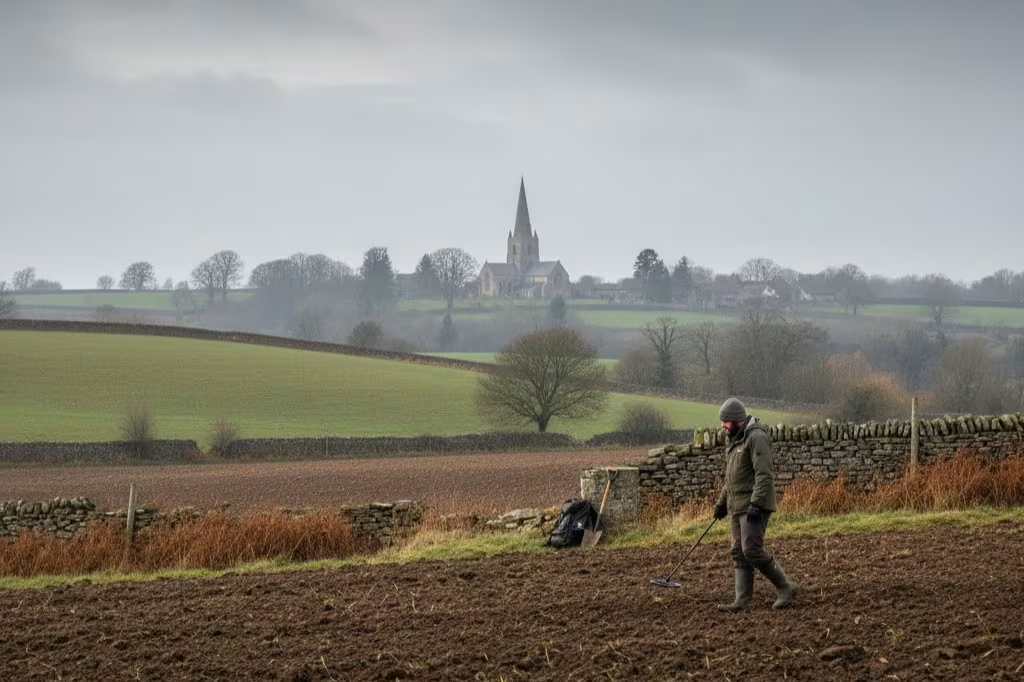
For Historical Enthusiasts: This is basically detecting heaven. Ciaran from The Metal Detecting Show, who’s been at this for 30 years, calls Norfolk the #2 spot in the world for serious history hunters [6].
For Beginners: It sounds scary, but organized tour packages make it totally doable.
England’s farmlands are constantly being plowed, which means Saxon, Viking, Roman, and medieval stuff keeps coming to the surface. The history here is wild – you’re not just detecting over one old settlement, you’re walking over ten different civilizations stacked on top of each other. It’s easily one of the best countries in the world for finding historical artifacts.
The legal stuff: The UK runs on the Treasure Act 1996 and something called the Portable Antiquities Scheme. You have to report any treasure finds to the local Coroner within 14 days. Sounds like a pain, right? But here’s the cool part: you typically get 50% of whatever it’s worth, split with the landowner.
The permission maze: This is where it gets tricky for tourists. You need permission from landowners before detecting on any land. Period. For someone just visiting, trying to track down farmers and ask permission is pretty overwhelming.
The easy solution: Tour companies like History Hunts and Roy Davis Metal Detecting Tours handle all this headache for you. These tour operators get all the permissions lined up, find you nice places to stay, and take you to spots that actually produce finds. No stress, no confusion.
What gets found: Roman coins, Celtic jewelry, Saxon and Viking stuff, medieval relics, WWII items, Georgian and Victorian treasures. First-time tour people have found gold Celtic coins on their very first trips.
Best time to visit: Autumn and winter after farmers plow their fields and bring historical items up. April through October has better weather if you don’t like being cold.
The setup: Public liability insurance runs about £8 per year through the National Council for Metal Detecting and covers you for £10 million. The detecting community is really welcoming, and there are tons of shops if your equipment needs repairs or you want to rent gear.
3. Australia’s Goldfields: Finding Real Gold Nuggets Down Under
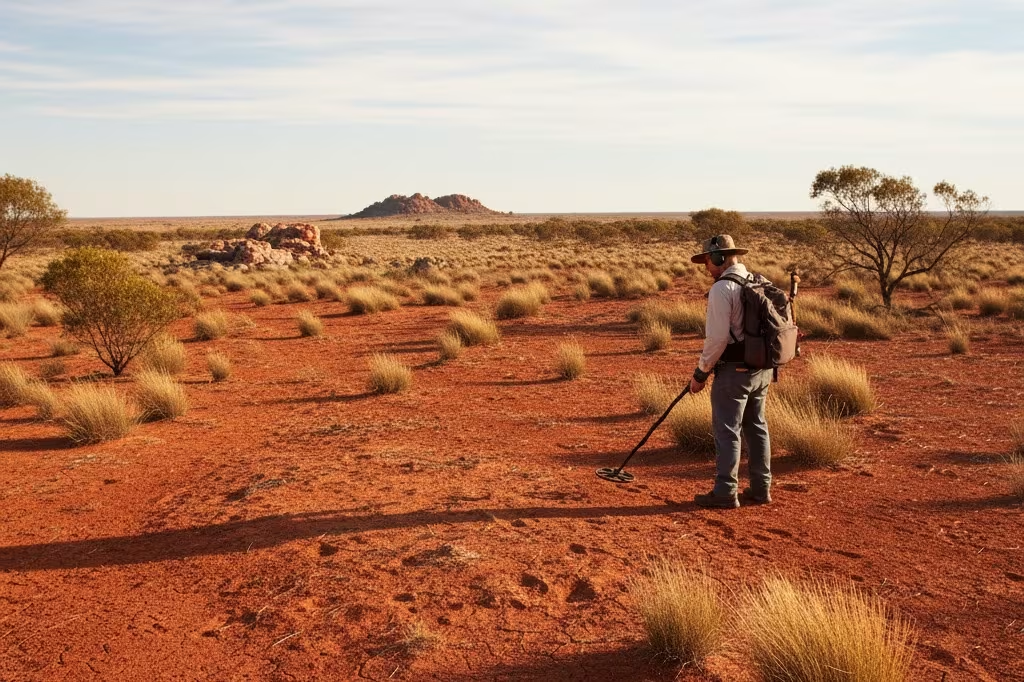
For All Skill Levels: This is surprisingly easy for international visitors to access if you get the right permits.
Australia sits in the top three worldwide for metal detecting destinations. The gold fields spread across Western Australia’s Kalgoorlie area, Victoria’s Central district, and Queensland’s gemfields, and people still pull out real gold nuggets regularly. This is one of the best places in the world if you want a real shot at finding gold on your vacation.
The permit deal: Western Australia’s Miner’s Right costs $29.50, you apply online in about ten minutes, and yes, overseas visitors can absolutely apply [5]. That one permit opens up huge areas of Crown land and state forests where you can legally detect.
What actually turns up: Gold nuggets (some pretty big ones), old pre-decimal coins, ancient Chinese coins from the gold rush days, war relics, minerals like sapphires, rubies, opals, and emeralds. One beach detector guy reported finding over 40 gold rings.
Two different experiences: Queensland and New South Wales beaches give you great beach detecting, while inland goldfields let you try real prospecting adventures.
Timing your trip: April through October gives you cooler weather that’s way more comfortable for detecting in the outback. Summer (December through February) brings extreme heat inland but lots of beach tourists who drop jewelry and coins.
Guided options: Several tour companies offer metal detecting vacation packages with all the equipment, training, and expert help you need. If you’d rather go solo, getting your permit through state mining departments is pretty straightforward.
4. Outer Banks, North Carolina: Historic Coastline with Real Shipwreck History
For Beginners: Perfect for moving beyond Florida’s simplicity without getting overwhelmed.
For History Buffs: Colonial and Civil War history with real shipwreck potential makes this one of the top spots in America.
The Outer Banks give you 200 miles of coastline mixed with colonial history, Civil War sites, and shipwreck treasure. This is where the first English settlement in America happened – Roanoke Island, back in 1585.
The legal picture: North Carolina lets you metal detect on most public beaches but not in state parks or historic sites. Always double-check current rules with local authorities before you start detecting.
Why it’s special: The “Graveyard of the Atlantic” has over 5,000 shipwrecks, which means you might find anything from Spanish coins to Civil War relics. Plus the modern beach traffic adds tons of lost gold jewelry and coins.
Best spots: Nags Head, Kill Devil Hills, and Corolla Beach are easy to access and have good historical potential. After storms, erosion exposes deeper layers just like in Florida.
Local help: Active clubs in the area can point you to producing spots and keep you updated on regulations.
5. California Beaches: Easy Access on the West Coast
For Beginners: No permits needed on most public beaches, which is perfect for starting out.
For Experienced Detectorists: Check out the historical piers and older beach resort areas for best results.
California’s long coastline offers lots of detecting options, though state parks need permits. The main advantage here is simple access to public beaches without complicated legal stuff. It’s one of the best vacation spots for West Coast people who want to try beach detecting.
Good locations: Huntington Beach, Newport Beach, and Santa Monica get heavy tourist traffic, which means consistent finds. Older areas near historical piers turn up vintage coins and jewelry.
Permit notes: East Bay Regional Parks need permits from their permit office. California State Parks generally don’t allow detecting without special use permits, which are tough to get.
Smart approach: Stick to city beaches and unincorporated public beaches outside state park areas. Hit those spots after summer weekends and holidays.
6. Virginia Historic Sites: Civil War and Colonial Treasure Territory
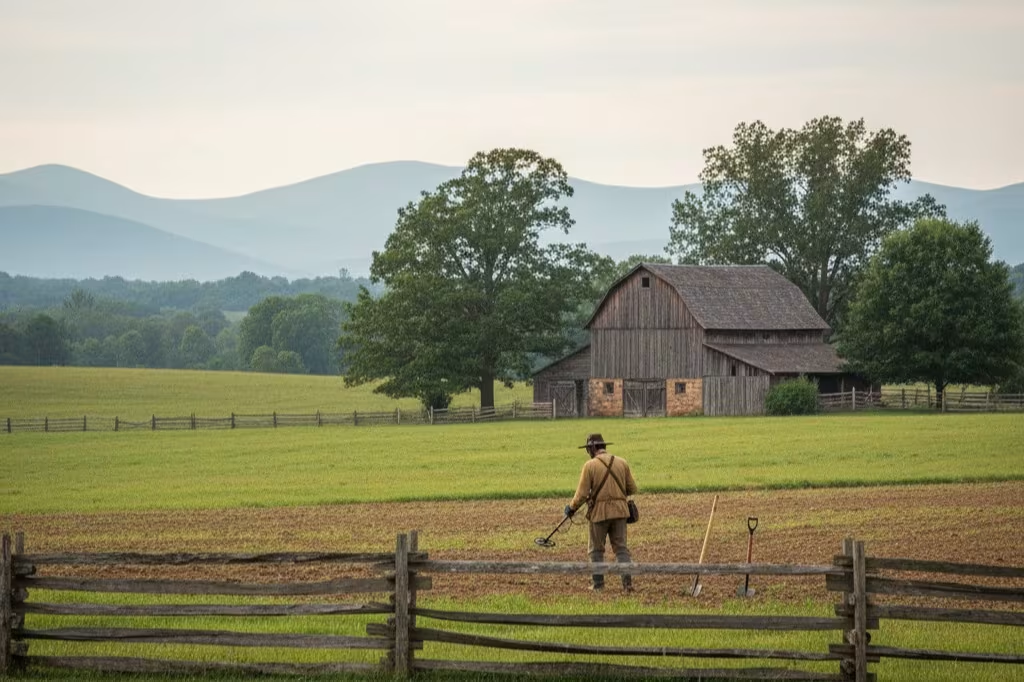
For History Enthusiasts: American history runs deep here with the right landowner permissions.
For Beginners: Getting permissions takes local connections, but it’s worth it if you love American history.
Virginia gives you incredible historical depth, but the best spots need landowner permission. You can’t detect in state parks or on federal lands including National Forests.
The opportunity here: Private farmland around Fredericksburg, Petersburg, and throughout the Shenandoah Valley holds Civil War relics, colonial artifacts, and even pre-colonial items.
The challenge: You need written permission from landowners. For tourists, this means connecting with local detecting clubs who can help make introductions.
What gets found: Minié balls, uniform buttons, colonial coins, Native American artifacts. In specific areas, the historical density rivals what you’d find in England.
7. Canada’s East Coast: The Quiet Option Nobody Talks About
For All Skill Levels: Underrated vacation spots that welcome tourists and make things simple.
Nova Scotia has detecting opportunities with simpler rules than a lot of other Canadian provinces. The Special Places Protection Act governs detecting, with restrictions on archaeological and heritage sites.
Why people go: Colonial history, maritime artifacts, and some gold prospecting opportunities in certain regions. Way less crowded than American spots.
Added bonus: English-speaking and close for US travelers, plus the locals are welcoming.
8. New Zealand: Gold Rush History Meets Stunning Scenery
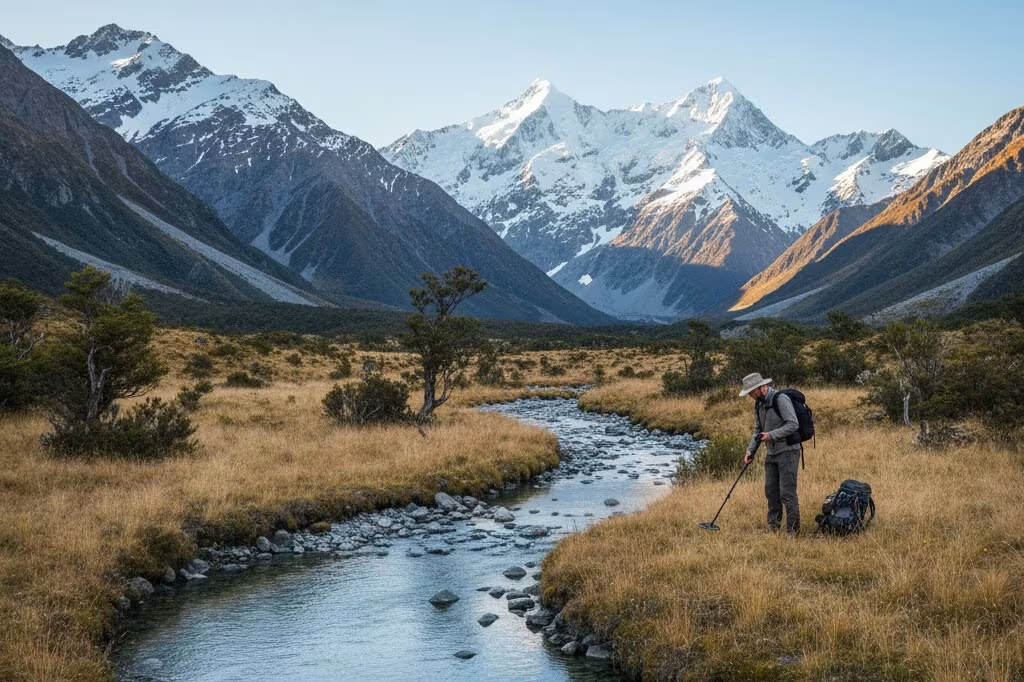
For History Buffs: Gold rush history from the 1860s plus scenery that’ll blow your mind.
For Adventure Seekers: Great for mixing treasure hunting with adventure tourism on one trip.
New Zealand offers gold prospecting and beach detecting with rules that change by region. Many public beaches allow detecting, though some conservation areas need permits. This is honestly one of the best vacation spots for combining multiple activities.
The history angle: Gold rush history from the 1860s gives you prospecting opportunities in Otago and West Coast regions.
The bonus: Mix your detecting with hiking, filming location tours from famous movies, and adventure activities all in one trip.
9. Detectival Rally, England: The Big Detecting Festival
For All Skill Levels: Unique organized event that works great for beginners and veterans alike.
Detectival is this huge rally on over 1,000 acres where thousands of detectorists gather for a weekend festival. All permissions are handled, experts are on-site, and the community atmosphere is amazing.
Why it’s cool: You get access to prime historical ground that individual tourists could never access on their own. Plus you’ve got built-in community for networking and learning from others.
10. The Hidden Gem Strategy: Detect Wherever You’re Already Going
For All Detectorists: Research detecting options at any destination you’re visiting anyway.
Here’s an approach most people miss: If you’re traveling somewhere for other reasons, look into local detecting opportunities. Business trip to the Netherlands? Weekend in Scotland? Family vacation in Italy?
The advantage here: Connect with local clubs through detector manufacturer websites or forums like TreasureNet. Locals often welcome visiting detectorists and give you access to spots you’d never find on your own.
The surprise factor: Some of my best finds happened during unplanned detecting sessions on otherwise normal trips. The key is doing your research ahead of time and reaching out respectfully to local communities.
Planning Your Trip: The Practical Stuff Nobody Tells You
Getting Your Detector Through Airport Security
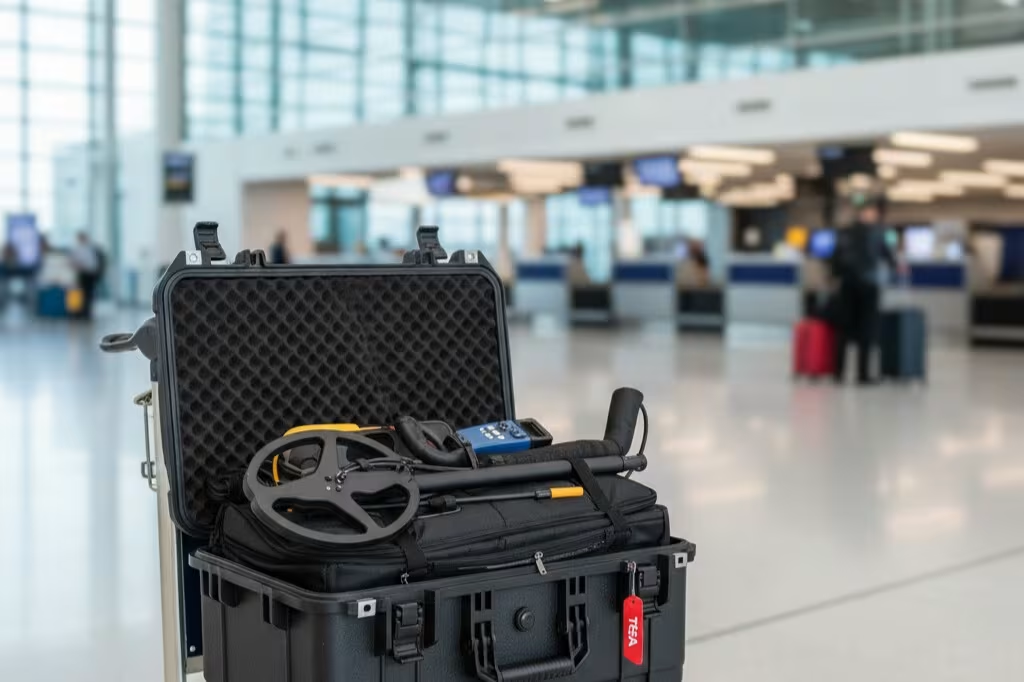
TSA actually lets you bring metal detectors in checked bags or carry-on. The catch is battery restrictions – lithium batteries over 100 watt-hours have to go in your carry-on luggage.
Pro move: Pull the batteries out completely and pack them separately. This saves you from awkward conversations with airline staff. Also, wrap your detector really well because baggage handlers aren’t exactly gentle with your stuff.
Alternative option: You can rent equipment at many tourist destinations. For short trips or testing new environments, renting beats dealing with transportation hassles.
Choosing Your Equipment
For Beginners: Start with all-purpose detectors like a Garrett AT Pro or Minelab Equinox series that work in multiple environments. Rent specialized equipment for specific environments instead of buying stuff before you know what you actually need.
For Experienced Detectorists: You already know what you like in equipment, but do your homework on local ground conditions. Mineralization, salt water, and soil composition change dramatically from place to place.
The Ethics That Actually Matter
Every traveling detectorist represents the whole hobby. The reputation of “nighthawks” – people who illegally detect and remove artifacts – has already damaged access in many regions.
The code that keeps access open:
- Always get permission before detecting private property
- Fill every single hole meticulously
- Pick up all trash you find, even if it’s not yours
- Report significant finds through proper channels
- Respect local laws even when they seem overly restrictive
- Approach landowners with humility, never entitlement
One bad interaction from a tourist can shut down detecting access for everyone who comes after. Your behavior directly affects other detectorists’ future opportunities.
What Success Actually Looks Like When You’re Out There
Different detectorists measure success differently. Some people focus on the historical importance of what they find – a hammered coin, a military button from a specific regiment, artifacts that tell real stories.
Others are pumped just finding anything older than themselves.
Both ways of thinking work perfectly fine. Even days when you come back empty-handed still give you value through the experience itself. The best trips combine these things:
- Realistic expectations about what you’ll probably find
- Learning the actual stories behind the locations
- Meeting local detectorists and landowners
- Embracing the hunt no matter what happens
- Leaving places cleaner than how you found them
Time to Start Planning Your Own Adventure
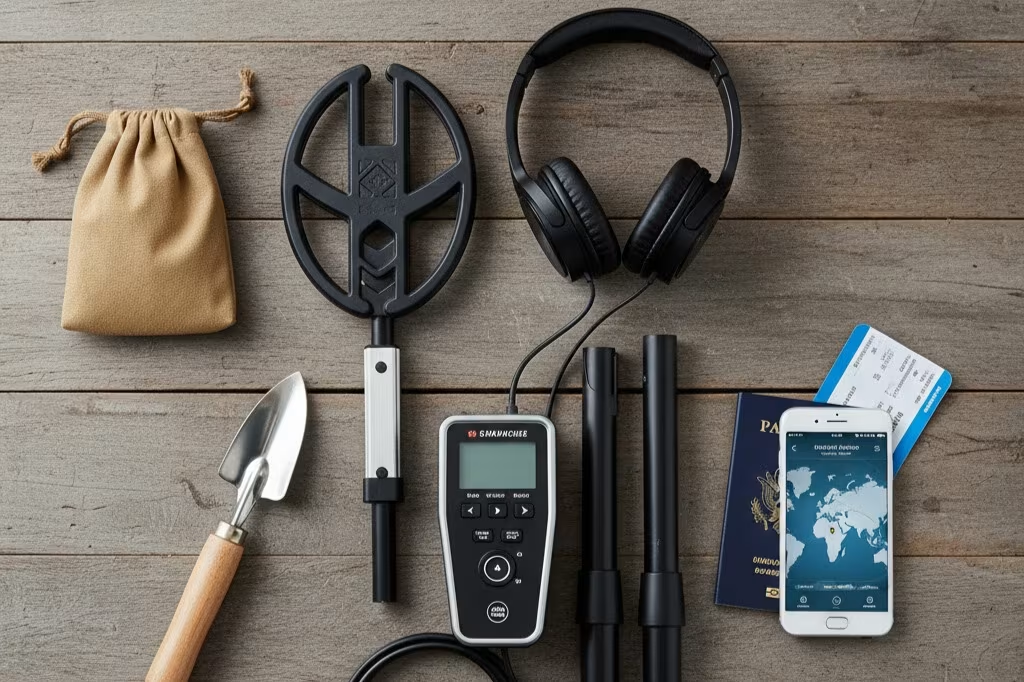
For beginners: Start your trip with Florida’s Treasure Coast or California beaches. The legal stuff is straightforward, you don’t need fancy equipment, and the learning curve is gentle. Connect with local clubs before your trip – they’ll share insider knowledge about productive spots and keep you updated on current rules.
For experienced detectorists: England tours give you access to historical depth you just can’t find anywhere else. Tour companies like History Hunts and England Metal Detecting Tours handle all the permission headaches and logistics. Australia’s goldfields offer something completely different – real prospecting opportunities for actual gold.
The biggest mistake people make? Thinking planning a detecting vacation is like planning a regular beach trip. It’s not even close.
The second biggest mistake? Letting all the legal complexity scare you away from trying. With proper research and respect for the rules, this is totally accessible, completely legal, and genuinely rewarding. These destinations are waiting for anyone willing to do the homework.
My neighbor’s got another England trip booked for next month to explore more historical sites. This time, I’m going with him. Three years ago, I thought he’d lost his mind for planning entire vacations around detecting.
Now I’m the one staying up late researching Saxon settlement patterns and plowing seasons in Norfolk farmland.
Welcome to the obsession. Plan carefully, respect the hobby, and happy hunting on your next adventure, traveling treasure seekers! 🔍✈️
Resources to Get Started:
- Check metaldetector.com‘s club directory to connect with local communities
- Join TreasureNet forums to learn from experienced traveling detectorists [9]
Remember: Always verify current regulations before traveling. Laws change frequently and local enforcement varies. This guide provides general information but can’t replace research into specific, current legal requirements for your chosen destination.
References
- Visit Florida Tourism – Florida Beaches Treasure Hunt: https://www.visitflorida.com/travel-ideas/articles/florida-beaches-treasure-hunt-east-coast-shoreline-treasures/
- Treasure Coast Metal Detectors – Metal Detecting Laws in Florida: https://treasurecoastmetaldetectors.com/blogs/news-1/metal-detecting-laws-in-florida-know-before-you-go
- National Council for Metal Detecting (UK): https://www.ncmd.co.uk/
- Portable Antiquities Scheme (UK): https://finds.org.uk/
- Gold Prospecting Western Australia – Miners Right Information: https://www.gold-prospecting-wa.com/metal-detecting-permit.html
- The Metal Detecting Show – Top Vacation Destinations: https://www.themetaldetectingshow.com/top-metal-detecting-vacation-destinations/
- TSA Metal Detector Policy: https://www.tsa.gov/travel/security-screening/whatcanibring/items/metal-detector
- History Hunts Metal Detecting Tours: https://www.historyhunts.com/
- TreasureNet Forums: https://www.treasurenet.com/

My name is Paul and I am the founder of Detector For Metal, a dedicated resource for metal detecting enthusiasts seeking to uncover historical treasures and connect with the past using the latest technology. As a stay-at-home dad and family man, I’ve found metal detecting to be the perfect hobby that combines family adventure with historical learnings for the whole family.
As a father, I’m deeply committed to passing on this hobby to the next generation of detectorists, starting with my own children. I share advice on everything from metal detecting with kids to exploring the top 10 metal detecting sites you never thought about. My methodical approach to the hobby goes beyond the thrill of discovery—it’s about creating family traditions while preserving history and sharing the stories of those who came before us.


